MusicRadar Verdict
It's your choice to decide if £1,599 is a worthy outlay for this guitar, but for us, the vibe, feel and the wealth of excellent tones would cause us to answer that particular question with a resounding yes.
Pros
- +
Breadth of great tones. Slim vintage neck.
Cons
- -
If only asking price could come down just a smidgen.
MusicRadar's got your back
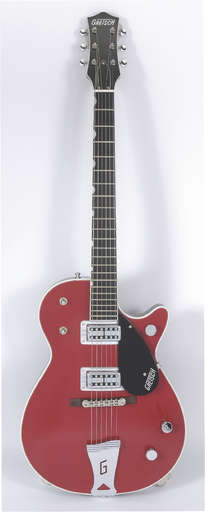
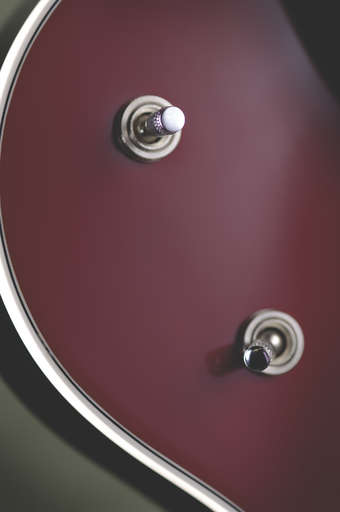
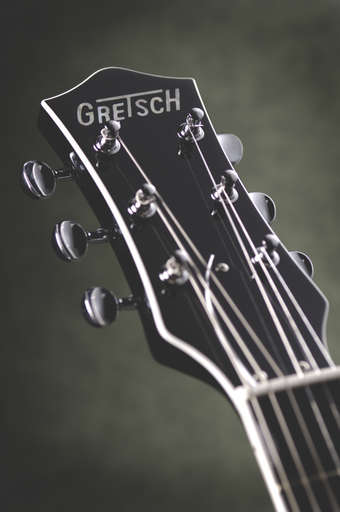
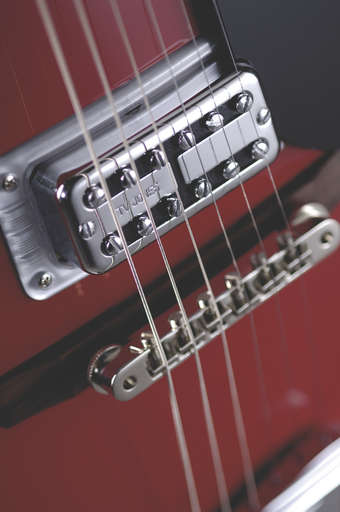
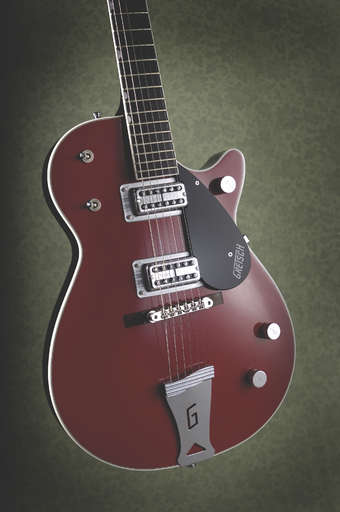
If, like us, you regularly peruse the Gretsch guitars catalogue you'll be struck by the sheer number of Jet guitars that seem to be available and, although they do have very different names - Silver, Sparkle, Duo, Power and so on - each has its roots way back in 1954, when the company first issued these smaller so-called solidbodies.
We say 'so-called solidbodies' as Jets are in fact semi-solid, and 52 years ago the bodies were manufactured from mahogany with tops demonstrating laminates comprising any mixture of spruce, maple, mahogany and even pine and a plastic material called Nitron, originally used in the manufacture of Gretsch drums.
The Jets were originally released to compete with the new Les Paul model that had been unleashed by Gibson less than two years previously, and models such as the Duo Jet (with a black finish), the Sparkle Jet (with a cool silver sparkle top) and the Round-Up (featuring the classic Gretsch Western trim) certainly caught the eye.
Also in the original batch were baritone and tenor ukulele Duo Jets and prices ranged from $230 to a princely $300.
The most famous Jet user has to be a certain George Harrison, who, legend has it, bought his first real guitar in 1960 from an ad placed in the Liverpool Echo.
The black Duo Jet supposedly cost him £75 and was used throughout The Beatles' early Hamburg days, through tours of Europe and the US in 1964, and during those iconic recording sessions. And let's face it, if it was good enough for him...
1955 saw the introduction of the Jet Firebird, a guitar that bristled with the same features as the Duo Jet aside from a black Lucite scratchplate and an eye-catching Oriental red finish.
Want all the hottest music and gear news, reviews, deals, features and more, direct to your inbox? Sign up here.
Described in fifties company literature as 'flashing brilliance for the progressive guitarist', the Firebird was certainly one of the flashiest guitars from any manufacturer at that time, and even now this brand new twist on the classic design is as cool as it ever was.
Modified
Gretsch doesn't pretend that this model is intended to be a late-fifties reissue, but rather a modified version with, as they put it, 'extra snarl'.
This bite comes courtesy of a pair of TV Jones Power'Tron pickups that continue that company's reverential re-invention of pickups designed by Gretsch. If you'd prefer this guitar with more traditional single-coils, one loaded with Gretsch DynaSonics goes for £1,929.
Original Jet Firebirds were fitted with standard Filter'Trons, but the TV Jones Power'Trons feature a pair of over-tall central bobbins that allow for additional winding of standard-gauge wire: that should help to account for the 'snarl'...
Controls here are also unchanged, comprising a volume for each pickup plus a master sited on the lower horn. There are also two three-way toggles, one for selecting pickups and the other acting as a master tone.
The latter uses a pair of internal capacitors to roll increasing levels of treble from whatever pickup selection you've chosen: the central position gives the natural, unadulterated tone, with up offering the maximum treble reduction.
One downside of Gretsch hardtails, especially to those of us who are heavy-handed, can be a genuine floating bridge: anyone who has hit their Gretsch too hard, only to see the bridge ping across the room, will understand.
Here the clunky 'space control' bridge of the originals, complete with oversized adjustment wheels, has been replaced with a modern and certainly more practical tune-o-matic bridge that rests upon a rosewood base secured to the top by two pins.
Problem solved! The ultra-cool G-Cutout tail crystallises the Gretsch vibe at a single stroke and, should you require a Bigsby vibrato, the G6131T-TVP, complete with Sperzel tuners, goes for £1,749.
The bound single-piece mahogany neck has a genuinely authentic vintage feel, with its V-shape gradually softening towards the heel and, with thumbnail inlays to the smooth ebony 'board, the guitar certainly has that elusive 'played-in' feel.
The charismatic elongated headstock sports a sextet of recently reintroduced Grover Sta-Tite tuners and that wonderfully higgledypiggledy inlaid logo.
As final proof that this guitar has at least one foot in the 21st century, the guitar is provided with modern knurled strap pins and comes with a set of Schaller strap locks.
Sounds
Here's where this Firebird really gets a chance to soar. The Power'Trons are certainly hotter than standard Gretsch humbuckers, but there's no danger of them ever
outdoing the likes of an EMG-81 or Seymour Duncan Invader. So, instead of that classic Gretsch twang, you're provided with a warm and full tone that initially comes as a real surprise, albeit a pleasant one.
The full bridge pickup tone has plenty of edge, but it also possesses depth much like an especially woody Telecaster and, through our clean Fender Blues Deluxe reissue, sounds absolutely breathtaking.
A simple upwards flick of the tone switch immediately rolls off around 70 per cent of the top, giving a toasty mellow tone that would send even the most dedicated insomniac off to Bedfordshire.
AC/DC's Malcolm Young has a signature Gretsch loosely based on a doublecut 1962 Jet and his cranking rhythm tone is probably about as dirty as we'd want to go with this Firebird.
For that classically insistent crunch the Power'Trons fully open the throttle with ease and, should you wish to go further down that route, the neck feel helps you all the way.
One of the most responsive tones was using the neck pickup with the tone switch in the down position. The best method of describing exactly how it sounds would be to imagine a fictional goldtop Gibson SG with a big P-90 sited between the traditional middle and bridge positions.
In other words you have a syrupy, woody and slightly tart rhythm tone that's velvety smooth and pin-sharp in equal measures. Ever heard anything like that? Nope, neither have we and, by flicking the switch to the up position, it gives a nigh-on perfect jazz tone too.
Some guitars whisper, smaller numbers say nothing, and fewer still speak to us: this Firebird Jet is in this latter category and for all styles short of hard rock and metal, there's a sound here you can use with confidence.
We're compelled to issue the same caveat at the conclusion of all Gretsch reviews we conduct: that price is a big hurdle to overcome. Remember that all full-on Gretsch guitars bear a 'Made in Japan' stamp and, as ever, it's your choice to decide if £1,599 is a worthy outlay for a guitar such as this.
For us, the vibe, feel and - most importantly - the wealth of excellent tones would cause us to answer that particular question with a resounding yes.
The semi-hollow construction and hard-tail configuration here seems to suit the pair of TV Jones pickups and associated three-way tone switch perfectly, and it is possible to flick from a woody twang to a smooth jazz tone whenever you need to.
A Gretsch guitar has to be on the shopping list of most guitarists out there irrespective of style and we reckon that, with this model, the equation between cost and practical use tips easily towards taking out yet another loan. Get to it!
Simon Bradley is a guitar and especially rock guitar expert who worked for Guitarist magazine and has in the past contributed to world-leading music and guitar titles like MusicRadar (obviously), Guitarist, Guitar World and Louder. What he doesn't know about Brian May's playing and, especially, the Red Special, isn't worth knowing.